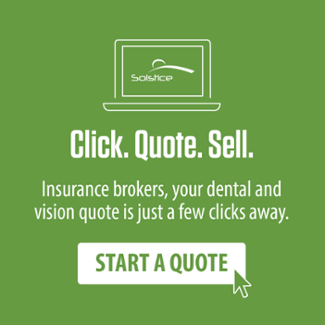By Andrew Hickey on Mar 15, 2023 1:29:00 PM
There are separations between dental and medical care. For example, many people will go in for a doctor’s visit before they go to the dentist due to fear of pain or cost (or both). Dental and medical practitioners do not typically coordinate patient care on the provider's side. However, oral health and overall health are strongly connected. And both are important to each other.
When it comes to insurance, there is a lack of awareness of how dentistry works and its associated costs. So, it’s your time to shine as a broker. You can demonstrate the value of dental benefits to clients of all sizes and individuals. You can also pitch to people on the public exchange, as Medicaid does not offer adult dental benefits, and Medicare has no dental coverage.
Key Takeaways:
- Boost your sales opportunities by cross-selling medical and dental.
- Dental and medical benefits are both critical for your clients.
- Routine dental check-ups, like medical, can help avoid more significant health issues and larger bills.
- Adding dental is low cost for clients and means more commissions for brokers.
In addition to the oral health and overall health connection, dental practice and technology advancements have made treatment more accessible and more comfortable than ever. Many dentists also utilize telehealth technology, so patients may not even need to go in person (depending on the reason for the visit). Add to that the low cost of dental benefits, and you have many compelling reasons for your clients to add dental to their mix.
By selling dental insurance, you will boost your business as a one-stop shop for medical and ancillary benefits. You can save your clients money with access to preventive dental care (like exams and X-rays). They will be less likely to miss work and have to pay the total cost for procedures such as root canals and tooth replacement. Here are key reasons you should sell dental and why your clients need it.
- The similarities between dental and medical benefits: If you already have clients enrolled in medical but not dental, they will be more likely to stick with you for all their insurance needs. You can point to these similarities when discussing medical and dental with your clients.
- Get rewarded for preventive care: typically, you will have no cost share for routine check-ups.
- Advantages for staying in-network: you will save money by visiting providers who participate in your plan.
- Support with benefits questions: You can assure your clients that, much like medical, they will have access to member services for their dental benefits. As their broker, you can also assist with their questions (service levels vary by carrier).
- Growing your business: People want dental care, and having the right dental insurance is essential. The American Dental Association (ADA) estimated an 81% rise in pre-COVID levels of patients going to the dentist. If you aim to improve your clients' health, your product offerings are not complete without dental insurance. In addition to demand from clients, dental commissions are three times higher than what you would earn with medical (typically 5% of the monthly premium). To help, there is a commission calculator you can use.
- Building a solid rapport with clients: Take the time to remind your clients of the connection between their oral and overall health. It can go a long way in motivating their decision to use ancillary benefits. Keeping up with dental care is critical to long-term health, so make sure they know it. If you have employer or group clients, you can help them fill the gaps of a limited benefits package. In the long run, having insurance in place for routine care can save them money. It can also lead to retaining employees and attracting new prospects. People with insurance plans are likelier to use the benefits and report overall job satisfaction.
- Teaching your clients about dental plans and health literacy: Many ordinary people and clients don’t have a clear understanding of ancillary benefits and the advantages that come with them. One survey showed that only nine percent of the U.S. population clearly understands basic insurance terms. By making your clients more health literate, they can get better health outcomes and save money on care. Once you have explained insurance terms and ancillary products, you can discuss the types of dental products. These include DHMO, DPPO, dental discount plans, and fee-for-service plans.
- Saving on costs: Dental services are typically less expensive than medical care. However, the costs add up if you skip the dentist for routine care and then need to go in for a more extensive procedure. 65% of Americans say they have skipped dental care due to lack of insurance and financial concerns. You can help your individual and group clients manage their health and save money when receiving care.
- Cross-selling and learning to adjust your sales pitch: Let your clients know if you sell additional insurance products other than what you offer upfront. You can’t expect people to know what you offer and understand the features. Make a habit of talking about dental benefits during your sales presentations. And save on some of the cost, time, and energy of targeting new clients by cross-selling insurance to your existing clients. Whether you’re meeting in person, virtually, or over the phone, you always have an opportunity to adjust your sales pitch. Part of that is taking the time to know your clients and understanding what benefits they need. This allows you to cater to your clients without overselling. The more authentic your presentation is, the more likely you are to close a deal. You don’t need to wait for a problem to connect with your clients. Lean into different forms of communication to keep the conversation going. This could include email marketing, staying on top of your social media, and being available by text.
- Selling dental on the healthcare exchange: You can broaden your sales opportunities by selling dental insurance products from the public health marketplace. Individuals and families without company-sponsored insurance use the marketplace to find coverage. Small employee groups of 50 employees or less can also be eligible to use the marketplace through the Small Business Health Options Program (SHOP). Having a broker like you in their corner can make the process easier and allow them to find the right fit for their needs. You can quickly sell on the marketplace after getting registered and completing some training.
- Work with dental carriers who make the process easier for you: You will want to offer your clients a choice of dental insurance options based on their coverage requirements and budget. You will want to ensure you partner with carriers who operate in the states you service and want to serve. It’s also helpful to know what each carrier's account management and member services experience is like.
If you’re not selling dental insurance, now’s the time to start. Don’t wait for the annual enrollment season. Keep yourself in the best position possible all year by selling medical and dental.
Any questions about your current Solstice products? Login to your portal on https://www.solsticemarketplace.com/
Want to start selling Solstice? Give us a call at 877-760-2247 or email us at sales@solsticebenefits.com





comments